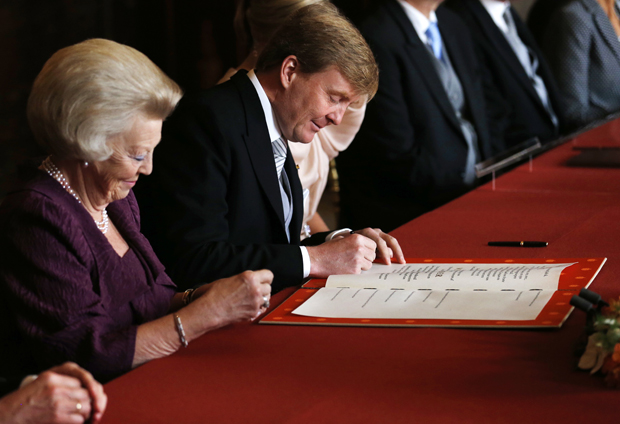Working for the King
The government consists of the King and the ministers, and the King’s Office serves as a link between them. As the head of state of the Kingdom of the Netherlands, the King performs a number of constitutional tasks, in which he is assisted by the King’s Office.

The King’s tasks
As laid down in the Constitution, Acts of Parliament and unwritten constitutional law, the King’s official tasks include:
- signing Acts of Parliament, Orders in Council and Royal Decrees applying to individuals or groups;
- ratifying international treaties;
- swearing in ministers, state secretaries and other senior officials;
- acting as the ceremonial president of the Council of State;
- delivering the annual Speech from the Throne at the opening of the parliamentary session on the third Tuesday in September, setting out the government’s policy plans for the coming year.
In addition to these official tasks, the King fulfils a unifying, representative and encouraging role as head of state. For example, he regularly pays working visits to Dutch provinces and municipalities, and visits the islands in the Caribbean part of the Kingdom. He also makes several state visits every year. In addition, the King receives heads of state and government who are visiting the Netherlands as well as other Dutch and foreign dignitaries.
Ministerial responsibility
The King’s position is laid down in the Constitution. The King is the head of state and is part of the government with the ministers. Under the Constitution, the ministers, and not the King, are responsible for acts of government. This means that the ministers are accountable to parliament for government policy and that they bear political responsibility for what the King says and does.
Consequently, the King confers regularly with the ministers and state secretaries, in particular the prime minister. The King’s weekly meetings with the prime minister generally take place on Monday afternoons, and he also meets the other members of the government on a regular basis. As head of state, the King has the right to be informed, to encourage and to caution, and these are among the purposes served by his regular meetings with the prime minister and other members of government.
